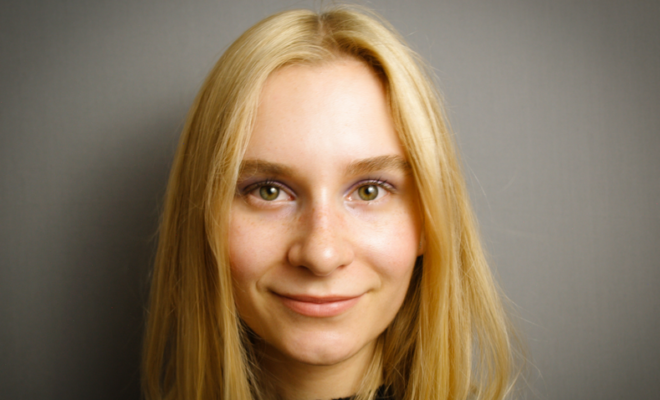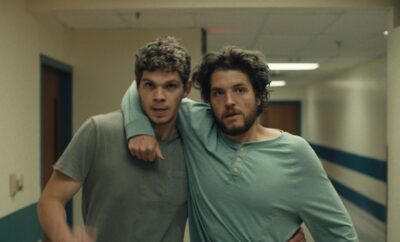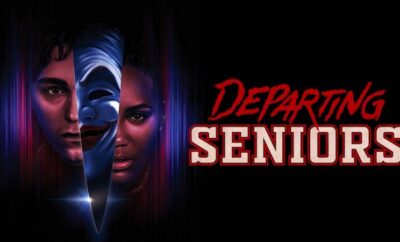
Interviews
Ella Greenwood – Faulty Roots
By: Lisa Steinberg
Q) Where did the idea and themes behind the movie Faulty Roots stem from and what was the writing process like for you putting the pieces of the puzzle behind the film together?
A) The idea came from me wanting to tell a story about something important and mental health is a topic that I’ve always felt very strongly about. I also knew that I didn’t want it to just be about mental health. I wanted it to be about friendship and the importance of having someone being there for you. I wrote it in one go and actually didn’t change much from the first draft other than a few spelling mistakes.
Q) You wrote, directed, produced and starred in the film – What was the most challenging hat and how did you balance your vision with the obstacles that came up as you began to plan versus putting to picture?
A) Directing was definitely the hardest, as I was trying to make sure the production as a whole was still running smoothly, that the other cast members were happy and prepared and that I did my character justice. Luckily, I had two amazing associate directors Abigail Vaughan and Lorna Reid throughout the duration of the shoot. So, they really helped me out. I enjoyed the whole producing process so much but, of course, there were times I had to compromise or change certain things. This mainly consisted of location changes and changes in crew members as well, but I’m so glad with how it all turned out.
Q) You sourced the film through crowdfunding, what do you think was the key to the successful outpouring of funds that were received in order to film?
A) Social media played a big part. People were kind enough to retweet or just to promote the film and this helped us reach an even wider audience. Mental health is a topic that a lot of people feel strongly about as well, so they wanted to support the project which I’m so grateful for. I also contacted producers to help and now have some amazing people on board.
Q) The film focuses on depression in teens, with so many ways to bring awareness, how did you make sure the film portrayed this authentically while capturing how to recognize the signs and risks, as well as ways to understand and empathize with the struggles teenagers face?
A) I think by deciding to write the film, it’s hopefully helped to portray this, as I think if you want it to be from a teenager’s perspective then you have to have a teenager write it and so I did. I wanted to demonstrate just some of the ways that a mental illness can affect everyday life, your mood, your relationships. I tried to demonstrate how some phrases and things can really not help and how other things such as just listening can.
Q) The cinematography of the film as well is tremendously well done. It’s an amazing element that adds to the continual building tensions and balance of light throughout the film. Can you talk about how this aspect helps amp up and intensify the featured themes?
A) We had an amazing director of photography, Ash Lang Wen Li, on board and she did such an amazing job. I wanted to make sure that although it was a film about depression, the film itself was colorful and bright. One reason for this is to counteract the theme and another is to show how things can seem so bright around a person but you may not know what it’s like from their perspective.
Q) How did working on this project really push your boundaries as a filmmaker?
A) It meant that I could get involved with various aspects of the whole production, not just acting. It pushed me as I wanted it to deal with such an important topic in the right way so, hopefully, I have succeeded with that.
Q) When you began filming, what were some moments you caught yourself absolutely entranced by the cast seeing how what you has written was being powerfully portrayed?
A) Sarah Eastwood, who plays Susan, and Sani Thabo, who plays Zack, are both incredible actors! It was so thrilling seeing them perform my work. I had worked with Sarah before and we didn’t rehearse prior to shooting. And with Sani, I remember at the rehearsal barely changing anything about his performance. He just was Zack straight away. So, they both brought the characters to life in such an amazing way.
Q) What did you learn and take away from your experiences working on this project?
A) I learnt how important it is to have a crew that you really enjoy working with. It made the whole process so smooth and rewarding. I also learnt that it’s important to allow others to do their jobs and trust that they’ll be able to understand your vision and also to enhance it.
Q) What do you think has really resonated with audiences after watching Faulty Roots?
A) The people that have seen it so far liked how it promoted the important theme of mental health, but that it was also enjoyable to watch because of the friendship between the main characters. They also said that the music is so effective and I have the wonderful composer Gaby Ambler to thank for that!
Q) What does strong female character mean to you?
A) It means a lot. We’re now getting so many more amazing female characters on screen and it’s just such an amazing experience to watch them. I absolutely loved Little Women and immediately wanted to see it again. So, I think that represents the importance of female filmmaking and strong female characters.
Q) As a female filmmaker, what words would you impart to women who aspire in those areas and are just beginning to make their own mark?
A) Don’t be intimidated if a job is largely carried out by men. If anything, let that motivate you even more to just do what you want to do and what you’re passionate about.





You must be logged in to post a comment Login